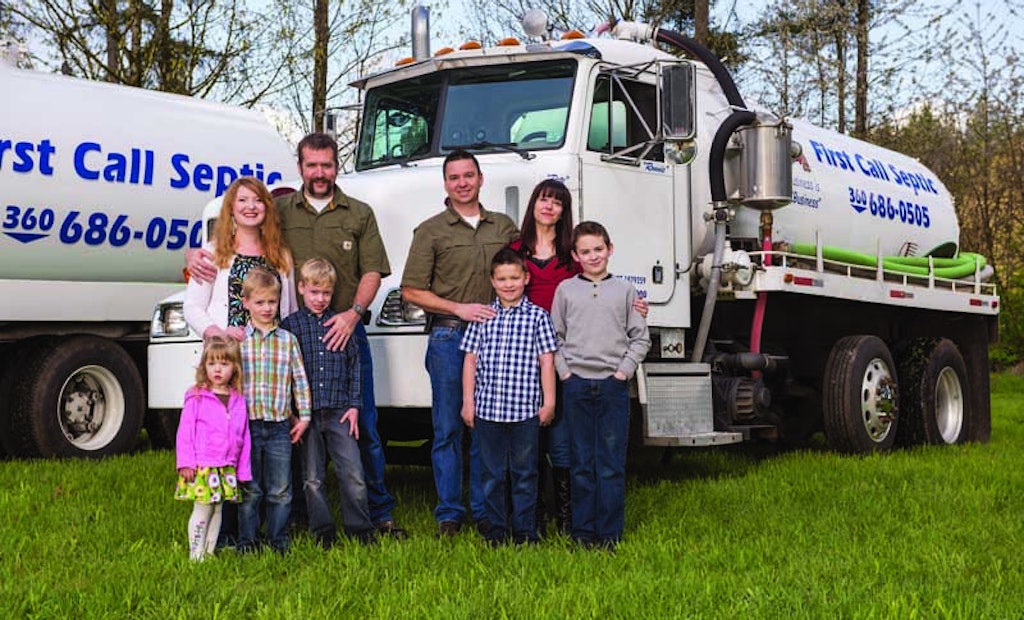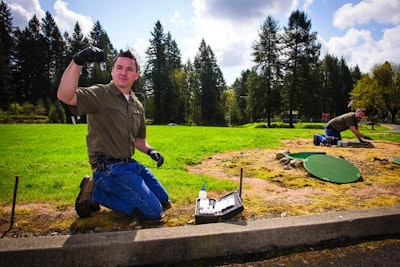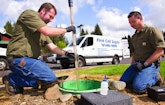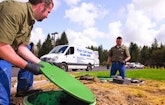
Interested in Grease?
Get Grease articles, news and videos right in your inbox! Sign up now.
Grease + Get AlertsWhen Ronnie Tamez shows up for a service call, he doesn’t want to tell his customer that he can’t solve the problem. Though one of his services is routine septic pumping, First Call Septic Services makes a good portion of its income doing repair and emergency work, as well as providing septic system inspections. Because Tamez and his employee are certified to work on all types of systems, there are few jobs they can’t handle.
That versatility – combined with an attitude of giving over-the-top customer service and education – has helped his young business in Battle Ground, Washington, experience steady growth.
Taking the plunge
After Tamez was laid off from a job manufacturing microchips in 2005, a friend suggested he seek employment at a septic service business owned by the friend’s father. Unfamiliar with the wastewater industry, Tamez says he had some reservations about the “dirty job’’ aspects of the work. He pursued the pumping job anyway and any doubts soon melted away, and he discovered a passion for the business.
Then when the economy took a turn for the worse with the real estate collapse, his boss decided to close shop. Tamez wasn’t ready to give up. So with a year’s worth of experience, some education and a wife pregnant with the couple’s second child, he took out a mortgage and purchased a used vacuum truck. He pumped one tank in late 2006 and made repair calls and inspections with the family car, a Honda Accord with the back filled with tools and parts.
“It was a cold start,” he recalls, since he was building a business from scratch. But it didn’t take him long to realize that pumping was just part of the picture. He knew that working his way through certification levels to be able to educate customers and repair the many types of systems would help build First Call into a successful business.
Know the business
“Most honest, informative and respectful person we’ve dealt with.” Facebook reviews like that verify the mission Tamez, his wife, Jennifer, and employee and friend, Chris Gross, prioritize for their business. They believe in being well trained and prepared to operate a septic service business in a state with more than 15 types of approved systems, from standard gravity drainfields to high-tech aerobic treatment.
If a homeowner’s septic alarm is triggered and sounds, Tamez asks questions and usually sends out a service van to investigate the cause. For example, the alarm may sound if a blower fails in an ATU. “We stock all the blowers (and other parts) in our service vans,” Tamez says. “I don’t want to respond to an alarm that we can’t service.”
YouTube pro
Tamez aims to help customers avoid service calls altogether by posting videos on his website’s septic blog. From explaining how different systems work to what to check when an alarm goes off to showing how “flushable” wipes clog a system, his goal is to educate consumers. While some might say the videos reduce potential income, Tamez is convinced the information helps earn trust and confidence with customers.
“The more I can teach someone, they know they need to take care of it (septic system),” he says.
He and Gross take videos with their Android cellphones, and First Call also has a waterproof Fuji camera for videotaping. Besides using the video for their website, it also comes in handy to send to engineers when the technicians have questions about a specific system.
Tamez and Gross also videotape their real estate transaction inspections, an important part of their business.
“For every real estate transaction (inspection), we do a video and people can see that stored on YouTube. Most of the time a buyer cannot be present for the inspection but would like to have seen it for future reference,’’ Tamez says. Uploading the videos to YouTube ensures they can be accessed by service technicians five or 10 years into the future, which he also sees as a good customer service.
The video is an extra free service First Call provides, and Tamez says Realtors in his area have taken notice and are calling. It’s extra work, Tamez admits, to edit and upload the videos (he says each takes about 45 minutes to edit and post). But he believes it is an important part of his job.
Spreading the word
Just because it’s his job, there is still room for fun, Tamez says. He laughs at customers’ standard puns and septic jokes, though he’s heard them repeatedly. He’s fine with that, because he communicates with humor in his conversations, on his website and in social media.
But the Tamezes took humor to a new level with a recent promotion. The company sent out “Poo*Pauns” ($20 off) on tan postcards. “If I want to do something, I might as well love doing it. Customers did like it,” Tamez says.
Jennifer Tamez has made the business work smarter, he says, as she has built up the database to generate reminder cards mailed to customers. In Washington, septic inspections are required every one, two or three years, depending on the system. Local health departments send out reminders, and First Call sends cards before or around the same time to keep the provider’s name in front of customers.
The creative coupons, reminder cards and a business card size ad in the phone book are the only marketing First Call uses besides its informative website and Facebook page. Though they don’t advertise on Facebook, they have paid to expand their reach on the social media outlet so friends of people on their page receive posts about the business.
First Call received valuable free TV time when Tamez responded to a call from a homeowner who was dissatisfied with another septic service provider. When Tamez investigated the system and reported there was a second tank, the customer didn’t believe him. But there was — a very full tank that was overflowing. The customer – who happened to be a television reporter – was so impressed he brought out a camera crew to tape Tamez at work for a tip segment that aired during the news program.
“The phone rang off the hook for about a month,” Tamez recalls.
Equipment upkeep
“I am not the cheapest up front, but we are the most cost-effective,” Tamez says. Unlike some companies that quote a lower per gallon fee but add fees and other costs that increase the bill, Tamez charges a flat per gallon fee. It’s clearly stated on the website.
Much of the time, First Call employees arrive at customers’ sites with one of the company’s two service vans, “Hans” and “Franz.” (Tamez likes to name his vehicles.)
The 2006 Freightliners with Mercedes-Benz V6 turbo diesel engines are more economical to run, averaging 20 mpg, compared to the vacuum trucks that average 4 mpg.
Repair and emergency work bring in the majority of income for the business, Tamez says, because few companies are available for after-hours work. Another 35 percent of the business comes from inspections.
Pumping brings in the rest of the income. For that he brings out the big rigs. “Mack,” a 1995 Mack CH613 with a 4,500-gallon steel tank and a Utile pump (Com Vac Systems), is the company’s workhorse truck with nearly 500,000 miles on the odometer. When business picked up, “Pete,” a 2004 Peterbilt, was added to the fleet. It has a 2,600-gallon steel tank and Jurop/Chandler pump.
“We have most things that septic contractors need to do their jobs — shovels, rakes, probes. Both Mack and Pete have Crust Busters on board — and we have a spare in the shop. We carry Sludge Judge sampling tools (Nasco) and nearly every tool T&T Tools Inc. has to offer,” Tamez says. They buy lids and risers from Orenco Systems.
“Harrison,” a 2006 F-250 pickup, tops off the fleet. “Harrison Ford is a really cool and gruff actor, which is why his name was most appropriate for the F-250, which has to haul around really heavy trailers with excavators on them,” Tamez says, explaining he rents equipment occasionally.
Keeping all the equipment clean is important to Tamez, and he and Gross take care of maintenance and cleaning equipment during slow times. But Tamez feels the extra cost of hiring a mobile fleet wash company is a good investment.
“They come every other week and power wash with acid to get to places you can’t reach,” Tamez says.
Future for families
With young sons who may be interested in joining the business someday, Tamez and Gross are working to grow it to sustain four workers.
“I don’t micromanage him (Gross). I treat him like a friend — more like a co-worker,” Tamez says. Tamez says he pays good wages, and Gross has a company credit card to pick up items he needs, including work clothes and quality Red Wing boots.
“First Call absorbs our lives,” Tamez admits. Building the business has meant long days. Tamez handles all the after-hours emergency calls. It’s not uncommon for him to post to Facebook a photo of the family enjoying free time eating out, then getting a call about an emergency to go to later that evening. In addition to work, he and Gross take 30-40 hours of classes annually to stay informed about the many systems and regulations in Washington so that they can be prepared for almost anything.
Anything, except system installation. While it’s a natural service addition, Tamez has friends that do it, and he doesn’t want to take away from their businesses. Adding portable restrooms is a feasible next step — possibly in 2016.
By then, the large shop Tamez is having built should be finished and an overhang would protect restrooms being stored outside. The shop is an important investment First Call has saved for. It will house both big rigs and service vans, offering more convenience for maintenance, repairs and cleaning.
It’s another improvement to ensure customer calls to First Call are good calls, Tamez says, that will be handled by knowledgeable professionals capable of fixing all types of systems.









